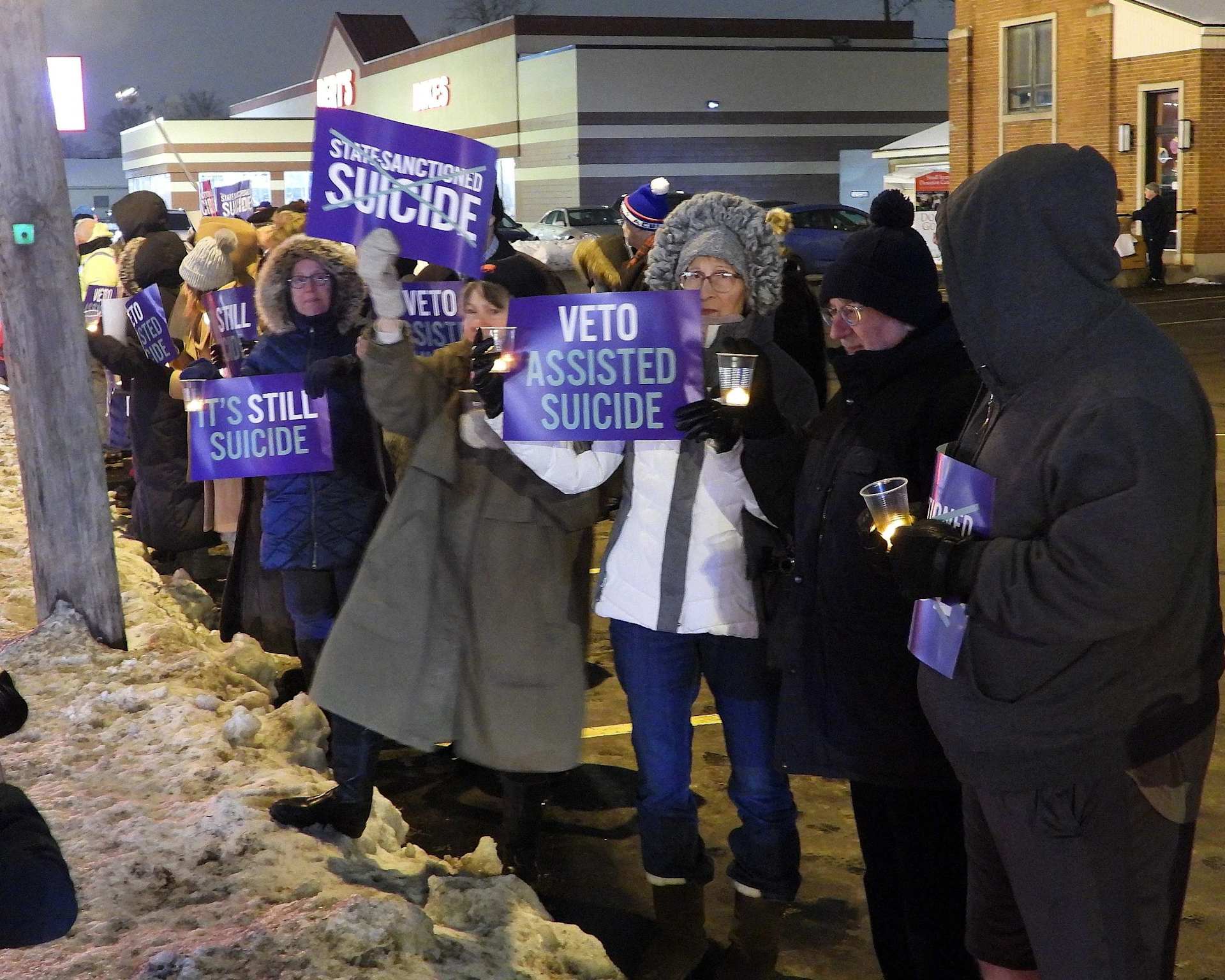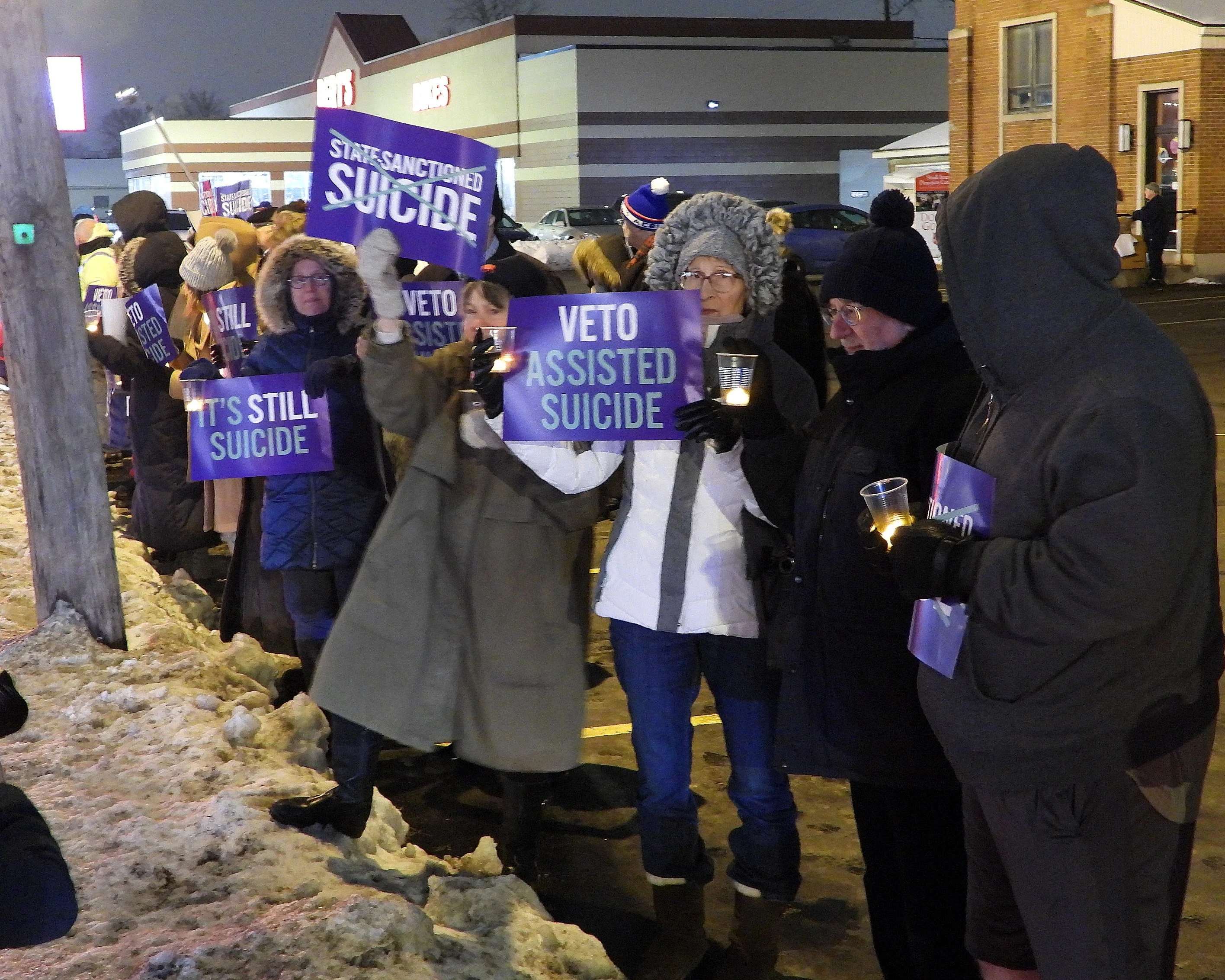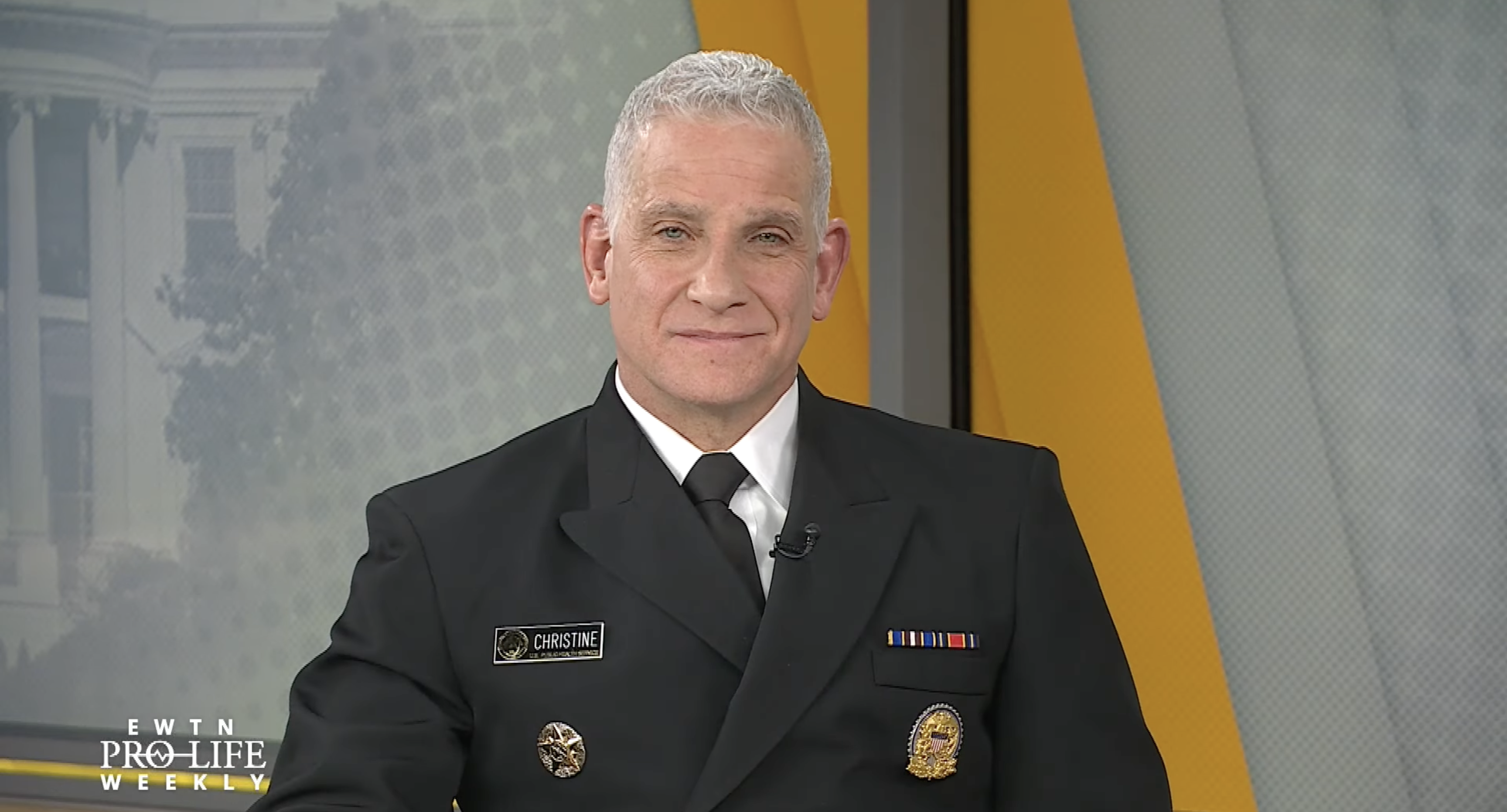
In spite of opposition from Catholic bishops and patient advocate groups, Gov. Kathy Hochul signed into law physician-assisted suicide in New York.


In spite of opposition from Catholic bishops and patient advocate groups, Gov. Kathy Hochul signed into law physician-assisted suicide in New York.

![‘My Catholic faith guides me’: HHS assistant secretary speaks on policy, saints #Catholic Adm. Brian Christine, assistant secretary for health at the Department of Health and Human Services (HHS) and a practicing Catholic, talked about the state of the pro-life movement as well as his own faith in an interview on “EWTN Pro-Life Weekly” on Wednesday.Christine, a practicing Catholic, said the HHS values religious freedom.“We are not going to allow health care practitioners to be disparaged or be discriminated against because of their faith,” he told host Abigail Galvan. “We faithful don’t have to check our faith at the door to practice medicine or science.”For his part, Christine said his faith and the example of the saints guides him.“My Catholic faith guides me,” he said. “Every decision that I make — I don’t set my faith aside at the door.”When asked if he had a particular devotion, Christine said he takes inspiration from many saints.“I don’t have a patron saint — I have a whole cloud of witnesses,” he said. “I have a whole cloud of saints because I need them. I’m really devoted to St. Peter the Apostle — I’ve made so many mistakes in my life. I’ve fallen so many times. But you get back up and St. Peter could deny the Lord, and yet there he is, the rock of the Church, the first pontiff, the first Holy Father.”“St. Thomas More, who really stood strong to serve in government and yet ultimately did what was right, and he paid the ultimate price,” Christine said.Christine said he also looks to a more recent blessed, Blessed Clemens August Graf von Galen, the archbishop of Münster in Germany in the 1930s and 1940s, and how he spoke out against euthanasia in his time.“He was known as the Lion of Münster because [of] his homilies against the Nazi T4 program, which was the euthanasia of those the Nazis considered undesirable for life or unworthy of life,” Christine said. “He preached such strong homilies against the T4 program that the Nazis ultimately stopped that program.”Abortion pillChemical abortions make up nearly two-thirds of U.S. abortions and are being mailed across state lines, even to states where unborn children are protected throughout pregnancy. Due to easy access to the abortion drug, mifepristone, abortion rates are climbing, making it a key issue in the pro-life movement.But action against chemical abortions has stalled in the Trump administration, which promised an investigation into the safety concerns for women surrounding the abortion pills.
Adm. Brian Christine, a practicing Catholic who serves as the assistant secretary for health at the U.S. Department of Health and Human Services, speaks with Abigail Galvan on “EWTN Pro-Life Weekly” on Feb. 4, 2026. | Credit: “EWTN Pro-Life Weekly” screenshot
When asked about this, Christine said that “data is being collected” and a review is “ongoing,” saying “the commissioner of the FDA [Food and Drug Administration], Dr. Marty Makary, has certainly committed to doing a review of the safety of mifepristone.”“That review is ongoing because we want to make sure we have the best data about the potential harm of mifepristone so that women can make truly informed-consent decisions,” Christine continued. “If women are considering using that drug, they need to understand what the implications may be.”Compassionate mental health careFor the HHS, “compassionate mental health care” for minors suffering from gender dysphoria “is incredibly important to the country,” Christine said.“It’s incredibly important to those most vulnerable, these minors who suffer from gender dysphoria, because gender dysphoria is a real condition, a mental health condition,” Christine said.Referring to an HHS study, Christine said that “using castrating chemicals — that is not the way to treat these vulnerable children.”“If you use the mental health support, the vast majority of these children are going to be very happy in their own skin,” he continued. “We don’t need to be cutting off body parts.”“We don’t need to be giving them chemicals that are going to cause irreversible harm for the rest of their life,” Christine said. “We have been very strong about this in the Trump administration. We have been led by [HHS] Secretary [Robert] Kennedy, and we’re never going to back away from these things.”](https://unitedyam.com/wp-content/uploads/2026/02/my-catholic-faith-guides-me-hhs-assistant-secretary-speaks-on-policy-saints-catholic-adm-brian-christine-assistant-secretary-for-health-at-the-department-of-health-and-human-ser-scaled.png)
Adm. Brian Christine, a practicing Catholic, talked about the state of the pro-life movement and how his faith guides him.



Jan 12, 2026 / 06:00 am (CNA).
Catholic medical professionals and ethicists had mixed reactions to the Centers for Disease Control and Prevention’s (CDC) announcement last week that it has revised the recommended childhood and adolescent vaccine schedule.
In a press release on Jan. 5, the CDC announced a revised recommended childhood immunization schedule, which reduces the number of universally recommended vaccines from 18 to 11. It retains routine recommendations for all children against measles, mumps, rubella, polio, pertussis, tetanus, diphtheria, Haemophilus influenzae type b, pneumococcal disease, human papillomavirus (HPV), and varicella (chickenpox).
Vaccines for rotavirus, influenza, COVID-19, hepatitis A, hepatitis B, meningococcal disease, and RSV now shift to recommendations for high-risk groups or after “shared clinical decision-making” between providers and families.
According to a Department of Health and Human Services (HHS) memo, the CDC “applies shared clinical decision-making recommendations when evidence indicates that individuals may benefit from vaccination based on an analysis of the individual’s characteristics, values, and preferences, the provider’s medical judgment, and the characteristics of the vaccine being considered.”
Insurance companies must continue to cover all vaccines.
The changes come after President Donald Trump directed the heads of the CDC and HHS in December 2025 to “review best practices from peer, developed nations regarding childhood vaccination recommendations and the scientific evidence underlying those practices” and to make changes accordingly.
After reviewing the vaccination practices of 20 peer nations, a scientific assessment found that “the U.S. is a global outlier among developed nations in both the number of diseases addressed in its routine childhood vaccination schedule and the total number of recommended doses but does not have higher vaccination rates than such countries.”
“Science demands continuous evaluation,” Dr. Jay Bhattacharya, director of the National Institutes of Health (NIH), said in the CDC press release. “This decision commits NIH, CDC, and the Food and Drug Administration (FDA) to gold standard science, greater transparency, and ongoing reassessment as new data emerge.”
Dr. Tim Millea, chair of the health care policy committee at the Catholic Medical Association (CMA), welcomed the changes, telling CNA that he thought the CDC approached the revisions “in a very logical way.”
“There has been a huge drop in trust surrounding vaccines since the COVID-19 pandemic,” Millea said. “The suggestions during COVID that the science was ‘settled’ rubbed a lot of us the wrong way.”
“The loudest critics of these new recommendations say this is ideology over science,” he said. “Science is a process, not an end. If we need more evidence, let’s get it,” he said, pointing out Bhattacharya’s call for “gold standard” science and “ongoing reassessment.”
Millea, a retired orthopedic surgeon, said he has confidence that Bhattacharya and Dr. Marty Makary, head of the FDA, are “not going to let ideology get ahead of science.”
The president of the National Catholic Bioethics Center (NCBC), John Di Camillo, told CNA in a statement regarding the updated immunization recommendations: “The people look to public health authorities precisely for this kind of guidance, which is responsive to continually evolving research, ongoing discussions among professionals in the medical field, and ethical principles that promote the common good, respect the dignity of the human person, and limit the interference of financial and ideological conflicts.”
Millea acknowledged that critics of the CDC’s revised recommendations say comparing the U.S. vaccine schedule to that of much smaller, more homogeneous nations such as Denmark is like “comparing apples to oranges.”
However, he pointed out that the CDC’s revised schedule is simply a recommendation, and each of the 50 U.S. states is free to do what it deems best. “It’s like 50 laboratories. Let’s see what works the best.”
Invoking the Catholic principle of subsidiarity, Millea said “let those closest to the children who are getting the vaccinations make the decisions.”
“One of the positive aspects of the pandemic is that now we can take a step back and we’re questioning, not because something may be wrong, but maybe because it could be improved upon,” Millea said.
John F. Brehany, executive vice president and director of Institutional Relations at the NCBC, told CNA that “the new schedule appears to have been designed with good intent; that is, … to have gained public trust in the absence of mandates and to have contributed to population health outcomes that meet or exceed those of the U.S.”
“The new schedule does not take a ‘one size fits all’ approach but rather structures recommendations based on the nature of the diseases, vaccines in question, and characteristics of the children or patients who may receive them,” he continued. “This approach appears to be well-founded and to provide a sound foundation for respecting the dignity and rights of every unique human person.”
Dr. Gwyneth Spaeder, a Catholic pediatrician in North Carolina, did not welcome the changes to the immunization schedule.
While she acknowledged that the damage to trust in institutions was substantial after the COVID-19 pandemic, she thinks the issues surrounding the COVID-19 vaccine’s safety and efficacy “cannot be compared” with the decades of studies demonstrating the safety of common children’s immunizations.
“It is not the same moral calculus,” she said.
She does not believe revising the immunization schedule this way will restore trust in institutions, which she said might take “years or even generations” to rebuild.
This method will “sow more confusion,” Spaeder said. “Instead of trying to rebuild trust in transparent, evidence-based practices, we have created a situation where everyone is told different things … For this child, we think this schedule is the best, for that child, there’s a different one. That’s not how public health works.”
She also said that comparing the homogeneous, relatively tiny population of 6 million in Denmark to that of the diverse population of 340 million in the U.S. is “a false comparison.”
“Their children are at less risk from falling through the cracks and contracting these diseases we try to vaccinate against,” she said, noting the protective public health effects of Denmark’s universal health care and generous parental leave policies.
“The children who will be most harmed in the U.S. are the underserved,” Spaeder said. “That’s being lost in this conversation. We can have a lot of high-level political arguments, but I am most concerned about my patients from single-parent homes who attend day care from young ages, or who are born to mothers who don’t have adequate prenatal care.”
“They will lose out the most from not being protected from these diseases.”
Read More